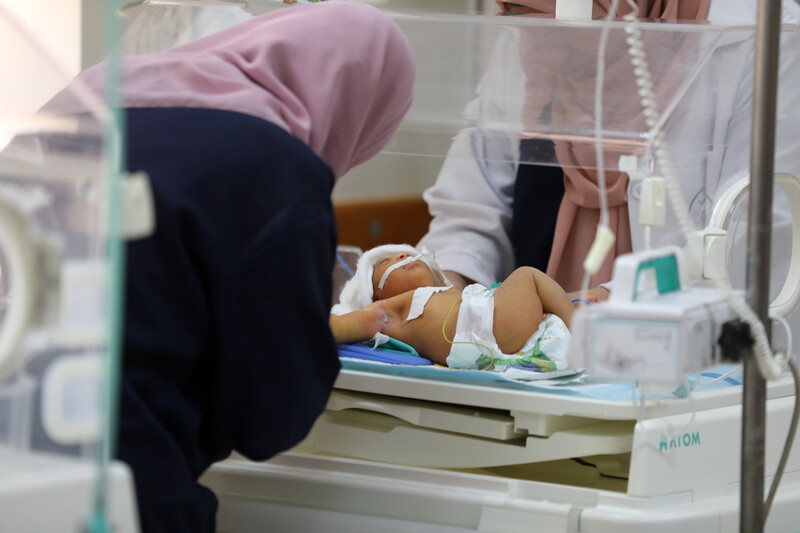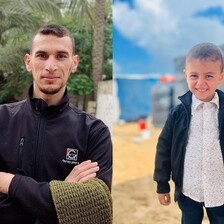The Electronic Intifada 1 June 2024

UNICEF says there are 17,000 children separated from relatives in Gaza. Here, a women conforts a newborn at al-Aqsa hospital in Deir al-Balah in the sourthern Gaza Strip on 29 May.
APA imagesInside the infant nursery of the Emirati Maternity hospital in Rafah, 5-month-old Yahya cried as a nurse tried to soothe him.
Some 40 kilometers away in the Jabaliya camp in northern Gaza, his mother, Sondos Hamouda, also cried — for the baby she is unable to see because of the presence of the Israeli military.
Yahya was born on 27 November, two months premature. The sounds of bombings and explosions and the roar of war planes overhead in Gaza made his mother’s already difficult delivery harder.
Complicating matters, the newborn had difficulty breathing and absorbing enough oxygen, and treatment began immediately at Kamal Adwan hospital in Beit Lahiya.
After saying goodbye to her baby through the glass window of the nursery, Sondos left the hospital with the intention of taking him home once his treatment was complete and his health had improved.
The Israeli military’s encroachment on the hospital, however, forced the medical staff to evacuate the infant to Rafah with the help of the Red Cross. At the time, Yahya was just 10 days old.
For a week, the infant required the help of a machine to breathe and extra medical attention before his condition started to significantly improve. However, due to the disruption of communications networks in Gaza, Sondos heard nothing about how her son was doing for three months.
Separation
“Israel robbed me of Yahya and my natural right to practice motherhood with my first child,” Sondos told The Electronic Intifada. “I wish to hug him and breastfeed him. My heart aches for him. He needs me a lot now that he is in this stage.”
Sondos and other members of her family continue to communicate with the medical team by video calls to track Yahya’s condition.
“Yahya grew up far from me,” Sondos said. “Each day of his absence is like a thousand years to me. When I see mothers breastfeeding their children, I cry bitterly and wish I were in their place, with my child in my arms, stroking his head, singing lullabies to him, and putting him on his little bed.”
She had painted and furnished a little bedroom for him and bought his first clothes before he was born and she said she keeps a pillow she sewed for him during pregnancy with her all the time.
Yahya’s father Zakaria shares Sondos’ sense of longing.
“My heart hurts more when I see him playing far away from me and hear his voice on the phone. I want to hold him in my arms and see him grow in front of me,” he said. “I can also picture how he will walk for the first time. I can’t wait to hear him call out for baba and mama.”
Zakaria and his wife Sondos have appealed to the Red Cross and human rights groups to help return their son so that he can grow up with his family.
“My sole wish in life is that we be reunited with Yahya,” Zakari said, who also voiced his concerns over his wife. “His mother is having nervous breakdown”
According to UNICEF statistics, at least 17,000 Palestinian children in the Gaza Strip have become unaccompanied or separated from their homes since the conflict began.
Separated children, according to UNICEF, are those who are without their parents, whereas unaccompanied children are those who are separated and do not have other relatives to take care of them.
On 8 May, the Emirati Maternity Hospital in Rafah, said it would stop admitting new patients, leaving thousands of pregnant women uncertain about where they can safely give birth, especially as most other health facilities in Gaza have been damaged or destroyed in Israeli attacks.
“We are experiencing an injustice that no family in the world should bear,” Zakaria says. “How can a country that claims democracy and freedoms deprive an infant of his father and mother?
Doaa Shaheen is a journalist from Gaza.





